Organizational Behaviour Theories and Culture
VerifiedAdded on 2020/10/22
|15
|4807
|324
AI Summary
The provided document is a comprehensive study on organisational behaviour, covering various theories and cultural aspects. It references multiple books and journals, including 'What Makes a Leader?' by Daniel Goleman, to explore the importance of leadership and motivation in organisations. The text also discusses the role of trust and confirmation in team development, as well as the impact of organisational culture on innovation and performance. By examining these factors, the study aims to provide insights into the complexities of organisational behaviour and how they can be effectively managed.
Contribute Materials
Your contribution can guide someone’s learning journey. Share your
documents today.
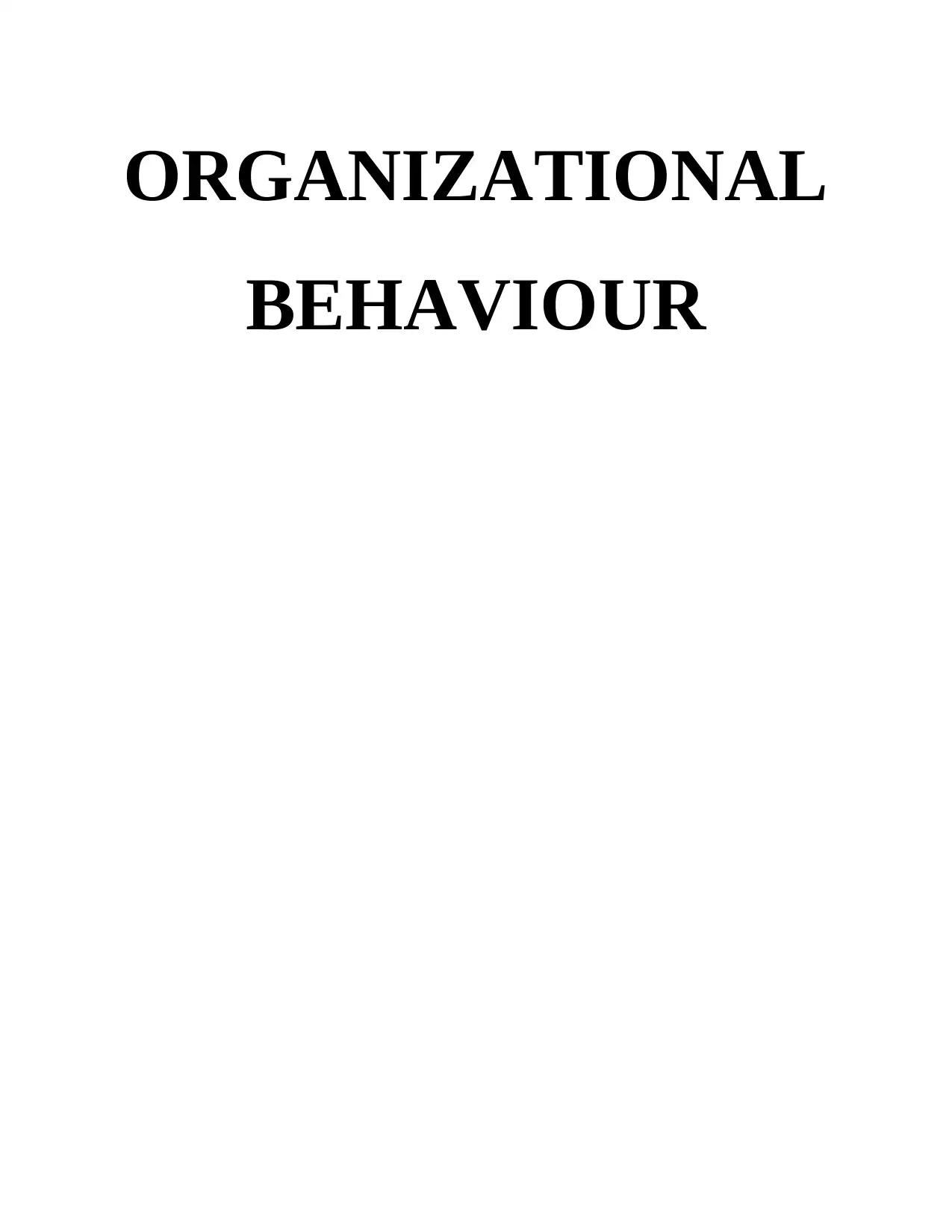
ORGANIZATIONAL
BEHAVIOUR
BEHAVIOUR
Secure Best Marks with AI Grader
Need help grading? Try our AI Grader for instant feedback on your assignments.
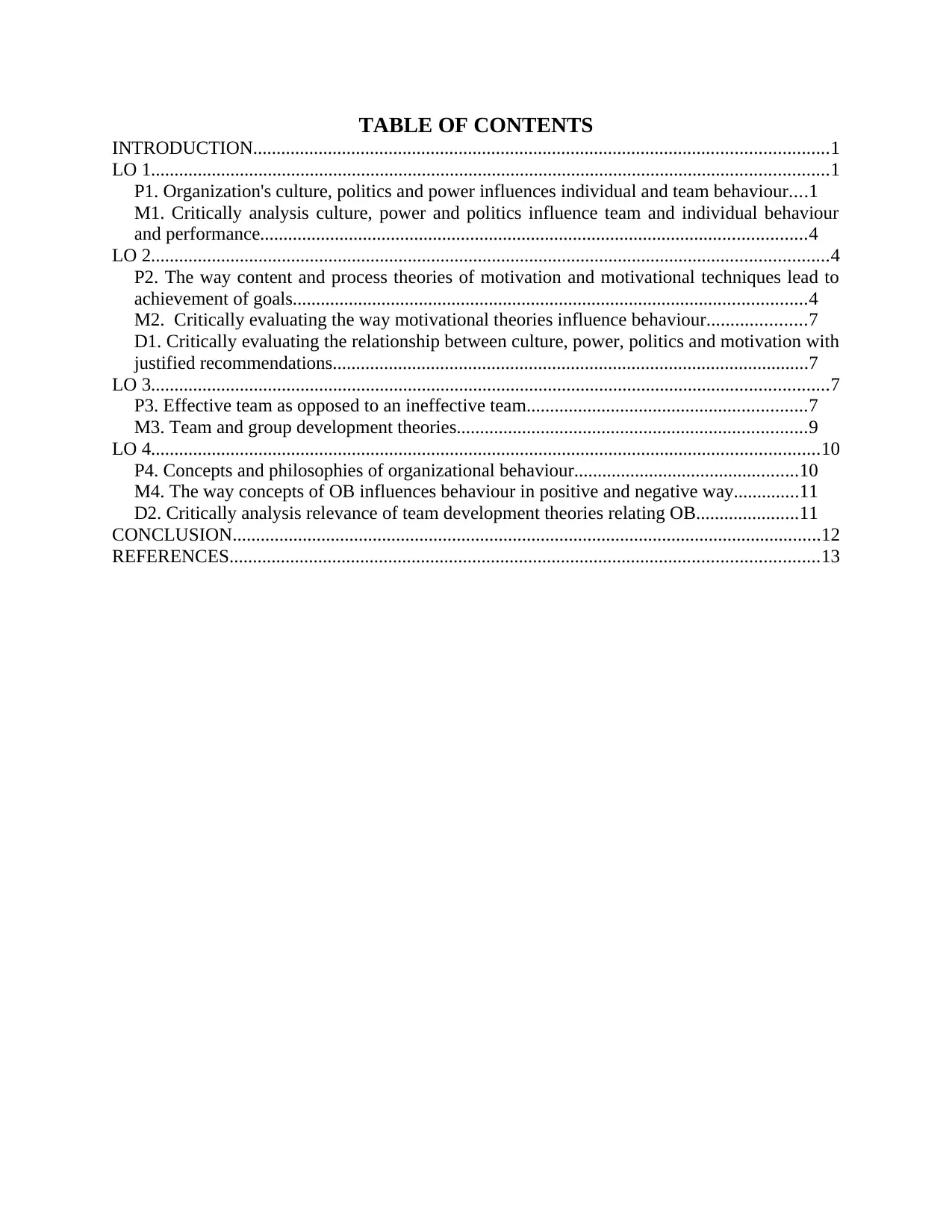
TABLE OF CONTENTS
INTRODUCTION...........................................................................................................................1
LO 1.................................................................................................................................................1
P1. Organization's culture, politics and power influences individual and team behaviour....1
M1. Critically analysis culture, power and politics influence team and individual behaviour
and performance.....................................................................................................................4
LO 2.................................................................................................................................................4
P2. The way content and process theories of motivation and motivational techniques lead to
achievement of goals..............................................................................................................4
M2. Critically evaluating the way motivational theories influence behaviour.....................7
D1. Critically evaluating the relationship between culture, power, politics and motivation with
justified recommendations......................................................................................................7
LO 3.................................................................................................................................................7
P3. Effective team as opposed to an ineffective team............................................................7
M3. Team and group development theories...........................................................................9
LO 4...............................................................................................................................................10
P4. Concepts and philosophies of organizational behaviour................................................10
M4. The way concepts of OB influences behaviour in positive and negative way..............11
D2. Critically analysis relevance of team development theories relating OB......................11
CONCLUSION..............................................................................................................................12
REFERENCES..............................................................................................................................13
INTRODUCTION...........................................................................................................................1
LO 1.................................................................................................................................................1
P1. Organization's culture, politics and power influences individual and team behaviour....1
M1. Critically analysis culture, power and politics influence team and individual behaviour
and performance.....................................................................................................................4
LO 2.................................................................................................................................................4
P2. The way content and process theories of motivation and motivational techniques lead to
achievement of goals..............................................................................................................4
M2. Critically evaluating the way motivational theories influence behaviour.....................7
D1. Critically evaluating the relationship between culture, power, politics and motivation with
justified recommendations......................................................................................................7
LO 3.................................................................................................................................................7
P3. Effective team as opposed to an ineffective team............................................................7
M3. Team and group development theories...........................................................................9
LO 4...............................................................................................................................................10
P4. Concepts and philosophies of organizational behaviour................................................10
M4. The way concepts of OB influences behaviour in positive and negative way..............11
D2. Critically analysis relevance of team development theories relating OB......................11
CONCLUSION..............................................................................................................................12
REFERENCES..............................................................................................................................13
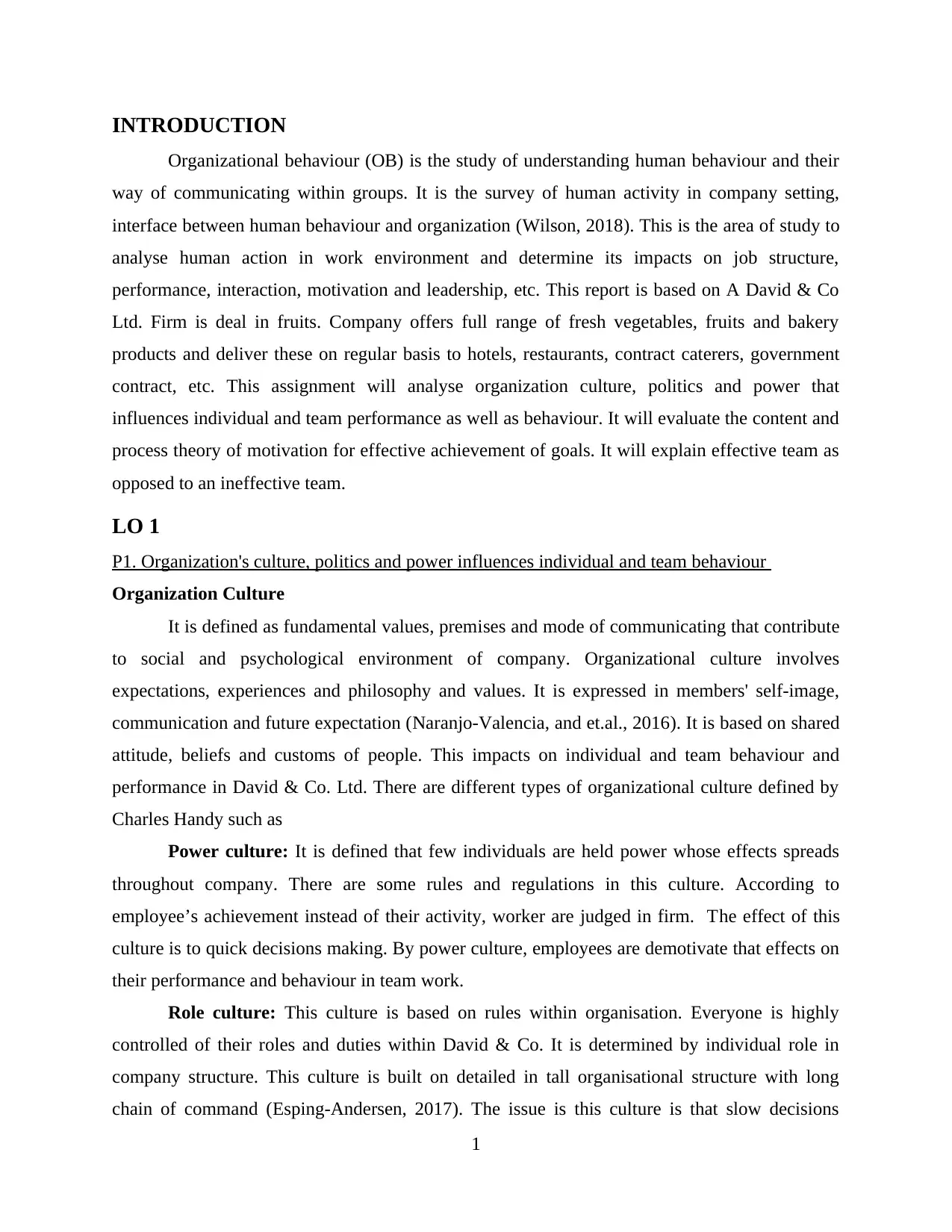
INTRODUCTION
Organizational behaviour (OB) is the study of understanding human behaviour and their
way of communicating within groups. It is the survey of human activity in company setting,
interface between human behaviour and organization (Wilson, 2018). This is the area of study to
analyse human action in work environment and determine its impacts on job structure,
performance, interaction, motivation and leadership, etc. This report is based on A David & Co
Ltd. Firm is deal in fruits. Company offers full range of fresh vegetables, fruits and bakery
products and deliver these on regular basis to hotels, restaurants, contract caterers, government
contract, etc. This assignment will analyse organization culture, politics and power that
influences individual and team performance as well as behaviour. It will evaluate the content and
process theory of motivation for effective achievement of goals. It will explain effective team as
opposed to an ineffective team.
LO 1
P1. Organization's culture, politics and power influences individual and team behaviour
Organization Culture
It is defined as fundamental values, premises and mode of communicating that contribute
to social and psychological environment of company. Organizational culture involves
expectations, experiences and philosophy and values. It is expressed in members' self-image,
communication and future expectation (Naranjo-Valencia, and et.al., 2016). It is based on shared
attitude, beliefs and customs of people. This impacts on individual and team behaviour and
performance in David & Co. Ltd. There are different types of organizational culture defined by
Charles Handy such as
Power culture: It is defined that few individuals are held power whose effects spreads
throughout company. There are some rules and regulations in this culture. According to
employee’s achievement instead of their activity, worker are judged in firm. The effect of this
culture is to quick decisions making. By power culture, employees are demotivate that effects on
their performance and behaviour in team work.
Role culture: This culture is based on rules within organisation. Everyone is highly
controlled of their roles and duties within David & Co. It is determined by individual role in
company structure. This culture is built on detailed in tall organisational structure with long
chain of command (Esping-Andersen, 2017). The issue is this culture is that slow decisions
1
Organizational behaviour (OB) is the study of understanding human behaviour and their
way of communicating within groups. It is the survey of human activity in company setting,
interface between human behaviour and organization (Wilson, 2018). This is the area of study to
analyse human action in work environment and determine its impacts on job structure,
performance, interaction, motivation and leadership, etc. This report is based on A David & Co
Ltd. Firm is deal in fruits. Company offers full range of fresh vegetables, fruits and bakery
products and deliver these on regular basis to hotels, restaurants, contract caterers, government
contract, etc. This assignment will analyse organization culture, politics and power that
influences individual and team performance as well as behaviour. It will evaluate the content and
process theory of motivation for effective achievement of goals. It will explain effective team as
opposed to an ineffective team.
LO 1
P1. Organization's culture, politics and power influences individual and team behaviour
Organization Culture
It is defined as fundamental values, premises and mode of communicating that contribute
to social and psychological environment of company. Organizational culture involves
expectations, experiences and philosophy and values. It is expressed in members' self-image,
communication and future expectation (Naranjo-Valencia, and et.al., 2016). It is based on shared
attitude, beliefs and customs of people. This impacts on individual and team behaviour and
performance in David & Co. Ltd. There are different types of organizational culture defined by
Charles Handy such as
Power culture: It is defined that few individuals are held power whose effects spreads
throughout company. There are some rules and regulations in this culture. According to
employee’s achievement instead of their activity, worker are judged in firm. The effect of this
culture is to quick decisions making. By power culture, employees are demotivate that effects on
their performance and behaviour in team work.
Role culture: This culture is based on rules within organisation. Everyone is highly
controlled of their roles and duties within David & Co. It is determined by individual role in
company structure. This culture is built on detailed in tall organisational structure with long
chain of command (Esping-Andersen, 2017). The issue is this culture is that slow decisions
1
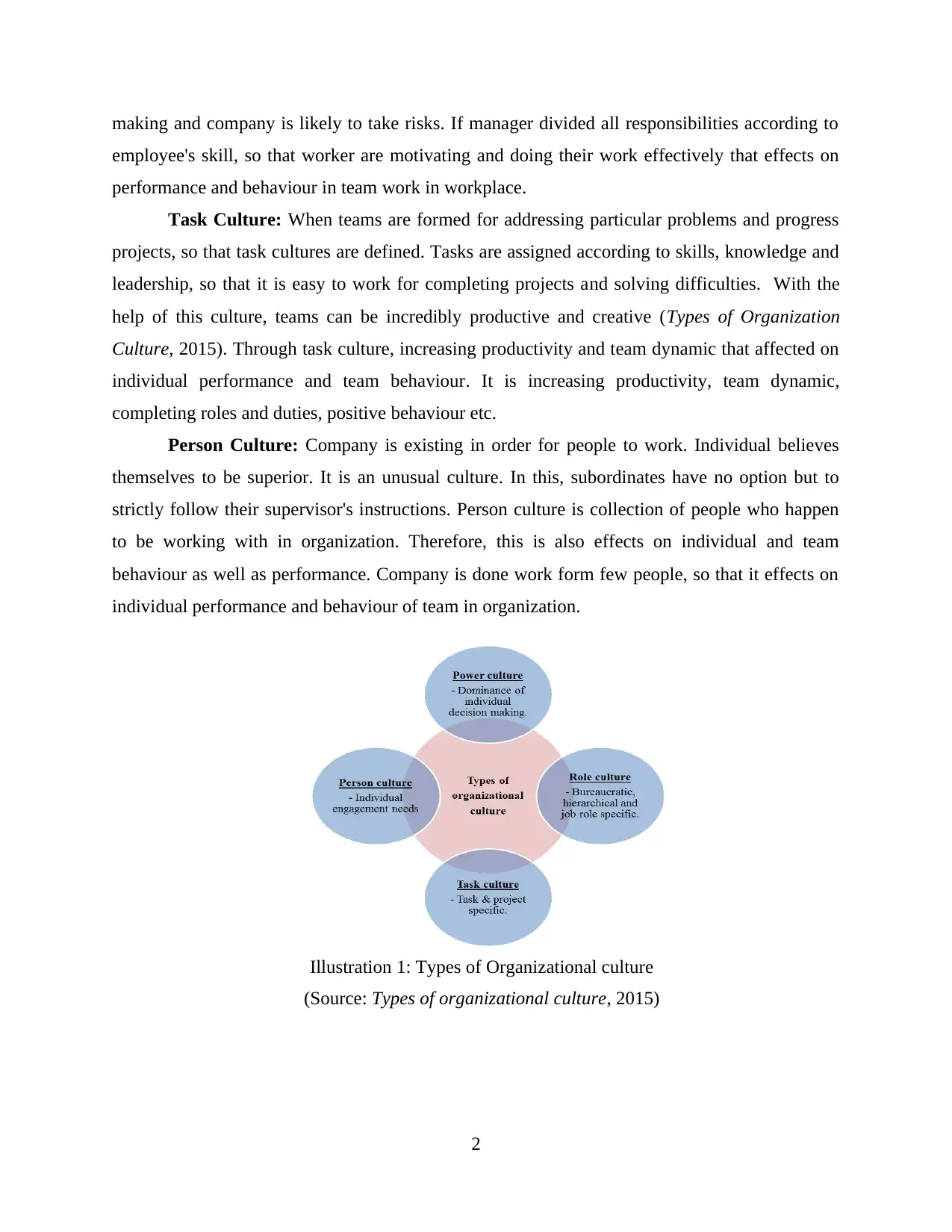
making and company is likely to take risks. If manager divided all responsibilities according to
employee's skill, so that worker are motivating and doing their work effectively that effects on
performance and behaviour in team work in workplace.
Task Culture: When teams are formed for addressing particular problems and progress
projects, so that task cultures are defined. Tasks are assigned according to skills, knowledge and
leadership, so that it is easy to work for completing projects and solving difficulties. With the
help of this culture, teams can be incredibly productive and creative (Types of Organization
Culture, 2015). Through task culture, increasing productivity and team dynamic that affected on
individual performance and team behaviour. It is increasing productivity, team dynamic,
completing roles and duties, positive behaviour etc.
Person Culture: Company is existing in order for people to work. Individual believes
themselves to be superior. It is an unusual culture. In this, subordinates have no option but to
strictly follow their supervisor's instructions. Person culture is collection of people who happen
to be working with in organization. Therefore, this is also effects on individual and team
behaviour as well as performance. Company is done work form few people, so that it effects on
individual performance and behaviour of team in organization.
2
Illustration 1: Types of Organizational culture
(Source: Types of organizational culture, 2015)
employee's skill, so that worker are motivating and doing their work effectively that effects on
performance and behaviour in team work in workplace.
Task Culture: When teams are formed for addressing particular problems and progress
projects, so that task cultures are defined. Tasks are assigned according to skills, knowledge and
leadership, so that it is easy to work for completing projects and solving difficulties. With the
help of this culture, teams can be incredibly productive and creative (Types of Organization
Culture, 2015). Through task culture, increasing productivity and team dynamic that affected on
individual performance and team behaviour. It is increasing productivity, team dynamic,
completing roles and duties, positive behaviour etc.
Person Culture: Company is existing in order for people to work. Individual believes
themselves to be superior. It is an unusual culture. In this, subordinates have no option but to
strictly follow their supervisor's instructions. Person culture is collection of people who happen
to be working with in organization. Therefore, this is also effects on individual and team
behaviour as well as performance. Company is done work form few people, so that it effects on
individual performance and behaviour of team in organization.
2
Illustration 1: Types of Organizational culture
(Source: Types of organizational culture, 2015)
Secure Best Marks with AI Grader
Need help grading? Try our AI Grader for instant feedback on your assignments.
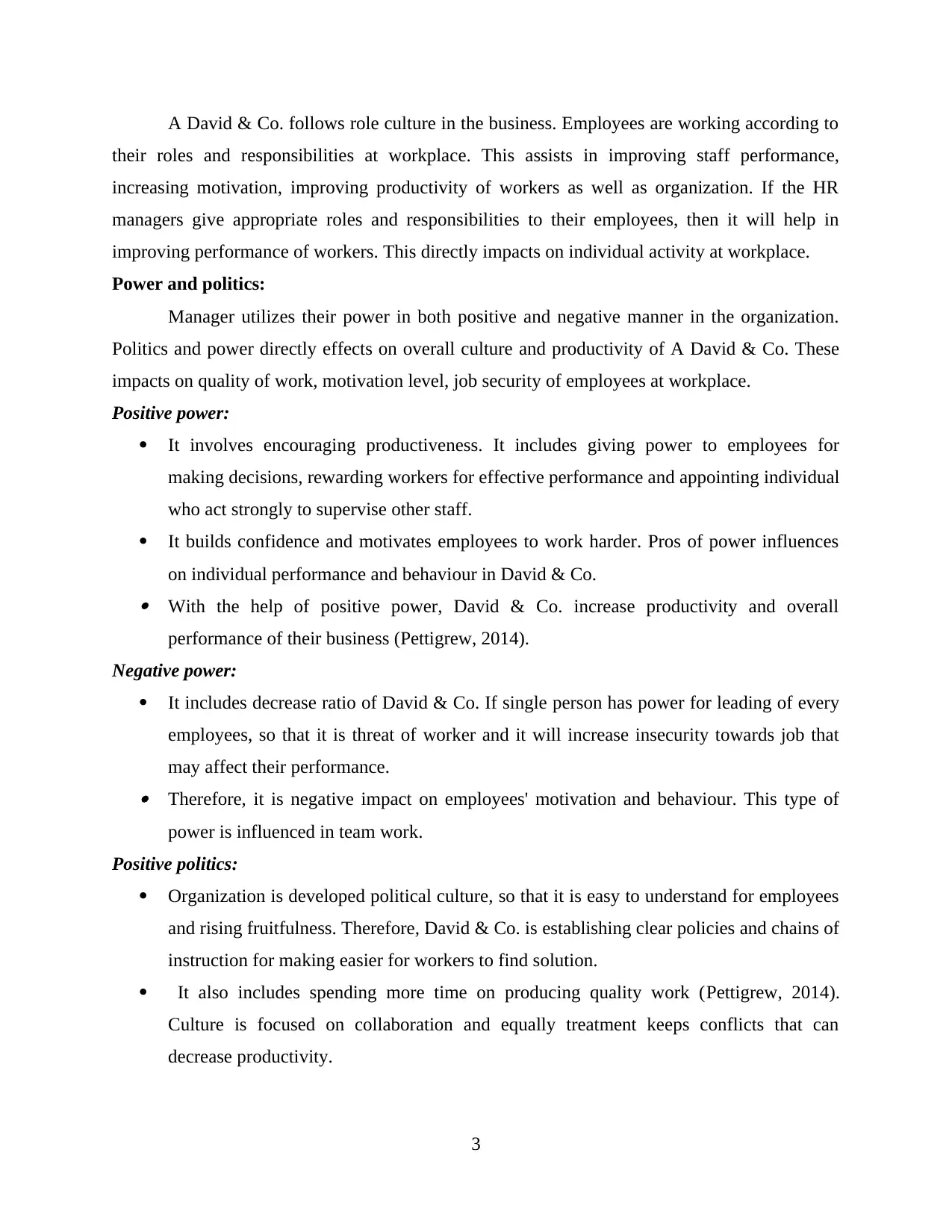
A David & Co. follows role culture in the business. Employees are working according to
their roles and responsibilities at workplace. This assists in improving staff performance,
increasing motivation, improving productivity of workers as well as organization. If the HR
managers give appropriate roles and responsibilities to their employees, then it will help in
improving performance of workers. This directly impacts on individual activity at workplace.
Power and politics:
Manager utilizes their power in both positive and negative manner in the organization.
Politics and power directly effects on overall culture and productivity of A David & Co. These
impacts on quality of work, motivation level, job security of employees at workplace.
Positive power:
It involves encouraging productiveness. It includes giving power to employees for
making decisions, rewarding workers for effective performance and appointing individual
who act strongly to supervise other staff.
It builds confidence and motivates employees to work harder. Pros of power influences
on individual performance and behaviour in David & Co. With the help of positive power, David & Co. increase productivity and overall
performance of their business (Pettigrew, 2014).
Negative power:
It includes decrease ratio of David & Co. If single person has power for leading of every
employees, so that it is threat of worker and it will increase insecurity towards job that
may affect their performance. Therefore, it is negative impact on employees' motivation and behaviour. This type of
power is influenced in team work.
Positive politics:
Organization is developed political culture, so that it is easy to understand for employees
and rising fruitfulness. Therefore, David & Co. is establishing clear policies and chains of
instruction for making easier for workers to find solution.
It also includes spending more time on producing quality work (Pettigrew, 2014).
Culture is focused on collaboration and equally treatment keeps conflicts that can
decrease productivity.
3
their roles and responsibilities at workplace. This assists in improving staff performance,
increasing motivation, improving productivity of workers as well as organization. If the HR
managers give appropriate roles and responsibilities to their employees, then it will help in
improving performance of workers. This directly impacts on individual activity at workplace.
Power and politics:
Manager utilizes their power in both positive and negative manner in the organization.
Politics and power directly effects on overall culture and productivity of A David & Co. These
impacts on quality of work, motivation level, job security of employees at workplace.
Positive power:
It involves encouraging productiveness. It includes giving power to employees for
making decisions, rewarding workers for effective performance and appointing individual
who act strongly to supervise other staff.
It builds confidence and motivates employees to work harder. Pros of power influences
on individual performance and behaviour in David & Co. With the help of positive power, David & Co. increase productivity and overall
performance of their business (Pettigrew, 2014).
Negative power:
It includes decrease ratio of David & Co. If single person has power for leading of every
employees, so that it is threat of worker and it will increase insecurity towards job that
may affect their performance. Therefore, it is negative impact on employees' motivation and behaviour. This type of
power is influenced in team work.
Positive politics:
Organization is developed political culture, so that it is easy to understand for employees
and rising fruitfulness. Therefore, David & Co. is establishing clear policies and chains of
instruction for making easier for workers to find solution.
It also includes spending more time on producing quality work (Pettigrew, 2014).
Culture is focused on collaboration and equally treatment keeps conflicts that can
decrease productivity.
3
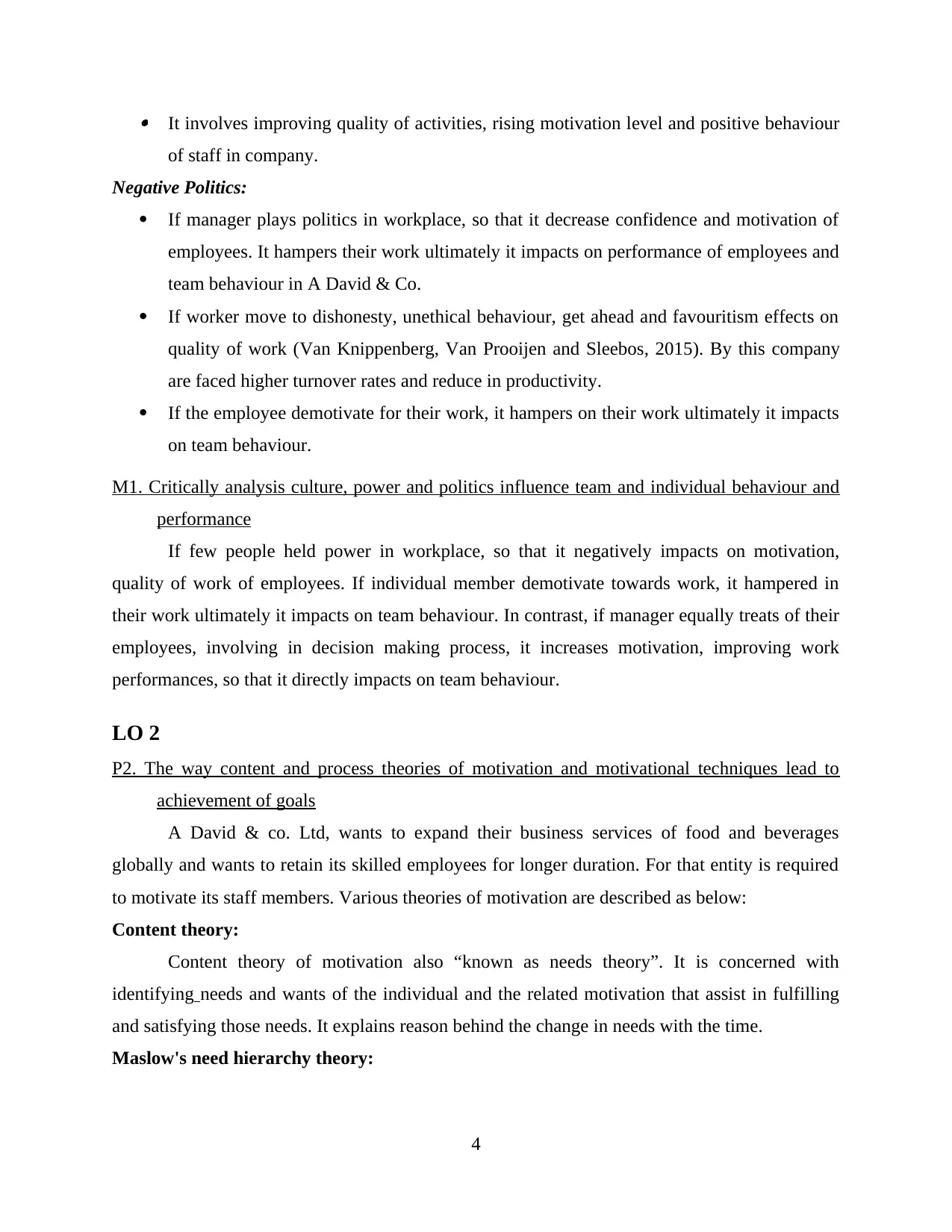
It involves improving quality of activities, rising motivation level and positive behaviour
of staff in company.
Negative Politics:
If manager plays politics in workplace, so that it decrease confidence and motivation of
employees. It hampers their work ultimately it impacts on performance of employees and
team behaviour in A David & Co.
If worker move to dishonesty, unethical behaviour, get ahead and favouritism effects on
quality of work (Van Knippenberg, Van Prooijen and Sleebos, 2015). By this company
are faced higher turnover rates and reduce in productivity.
If the employee demotivate for their work, it hampers on their work ultimately it impacts
on team behaviour.
M1. Critically analysis culture, power and politics influence team and individual behaviour and
performance
If few people held power in workplace, so that it negatively impacts on motivation,
quality of work of employees. If individual member demotivate towards work, it hampered in
their work ultimately it impacts on team behaviour. In contrast, if manager equally treats of their
employees, involving in decision making process, it increases motivation, improving work
performances, so that it directly impacts on team behaviour.
LO 2
P2. The way content and process theories of motivation and motivational techniques lead to
achievement of goals
A David & co. Ltd, wants to expand their business services of food and beverages
globally and wants to retain its skilled employees for longer duration. For that entity is required
to motivate its staff members. Various theories of motivation are described as below:
Content theory:
Content theory of motivation also “known as needs theory”. It is concerned with
identifying needs and wants of the individual and the related motivation that assist in fulfilling
and satisfying those needs. It explains reason behind the change in needs with the time.
Maslow's need hierarchy theory:
4
of staff in company.
Negative Politics:
If manager plays politics in workplace, so that it decrease confidence and motivation of
employees. It hampers their work ultimately it impacts on performance of employees and
team behaviour in A David & Co.
If worker move to dishonesty, unethical behaviour, get ahead and favouritism effects on
quality of work (Van Knippenberg, Van Prooijen and Sleebos, 2015). By this company
are faced higher turnover rates and reduce in productivity.
If the employee demotivate for their work, it hampers on their work ultimately it impacts
on team behaviour.
M1. Critically analysis culture, power and politics influence team and individual behaviour and
performance
If few people held power in workplace, so that it negatively impacts on motivation,
quality of work of employees. If individual member demotivate towards work, it hampered in
their work ultimately it impacts on team behaviour. In contrast, if manager equally treats of their
employees, involving in decision making process, it increases motivation, improving work
performances, so that it directly impacts on team behaviour.
LO 2
P2. The way content and process theories of motivation and motivational techniques lead to
achievement of goals
A David & co. Ltd, wants to expand their business services of food and beverages
globally and wants to retain its skilled employees for longer duration. For that entity is required
to motivate its staff members. Various theories of motivation are described as below:
Content theory:
Content theory of motivation also “known as needs theory”. It is concerned with
identifying needs and wants of the individual and the related motivation that assist in fulfilling
and satisfying those needs. It explains reason behind the change in needs with the time.
Maslow's need hierarchy theory:
4
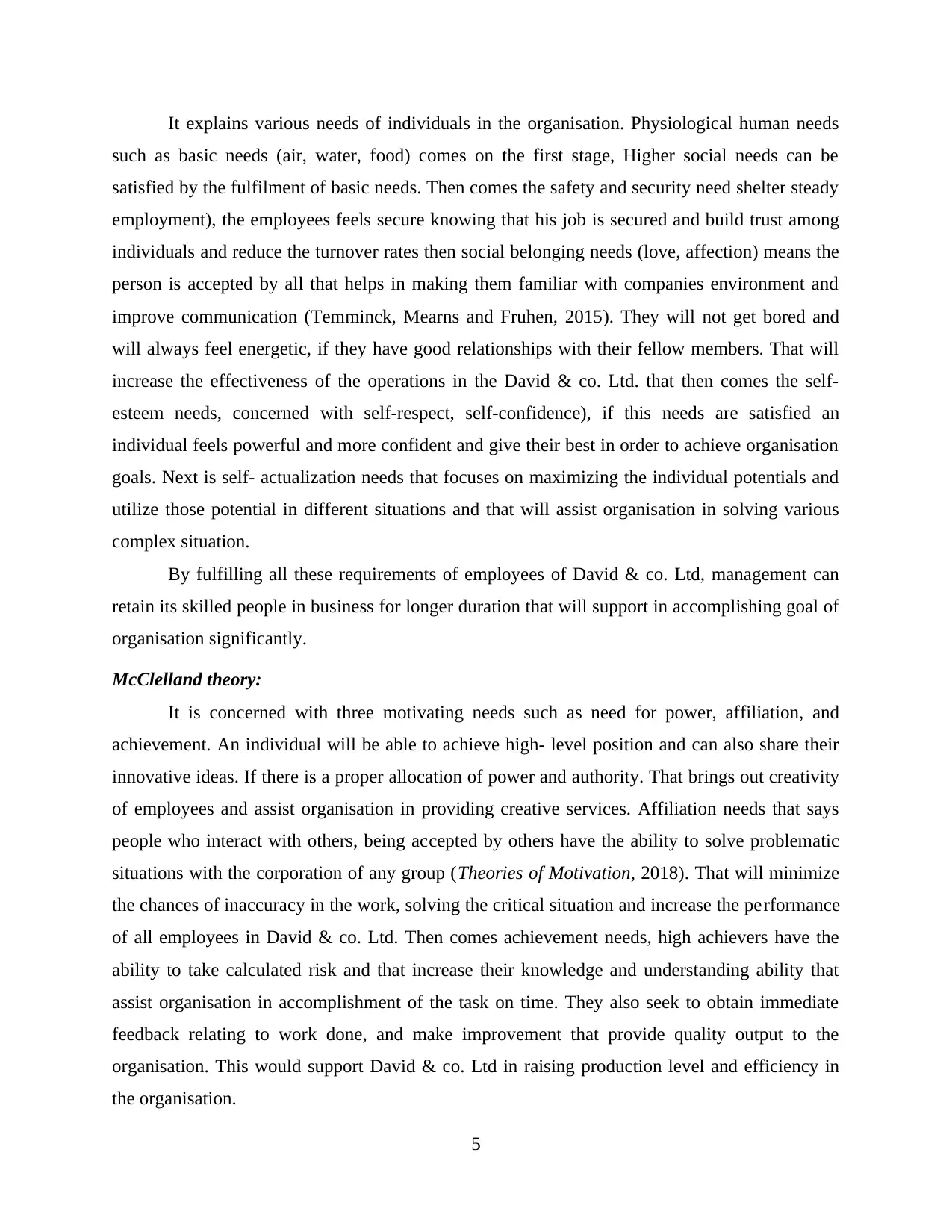
It explains various needs of individuals in the organisation. Physiological human needs
such as basic needs (air, water, food) comes on the first stage, Higher social needs can be
satisfied by the fulfilment of basic needs. Then comes the safety and security need shelter steady
employment), the employees feels secure knowing that his job is secured and build trust among
individuals and reduce the turnover rates then social belonging needs (love, affection) means the
person is accepted by all that helps in making them familiar with companies environment and
improve communication (Temminck, Mearns and Fruhen, 2015). They will not get bored and
will always feel energetic, if they have good relationships with their fellow members. That will
increase the effectiveness of the operations in the David & co. Ltd. that then comes the self-
esteem needs, concerned with self-respect, self-confidence), if this needs are satisfied an
individual feels powerful and more confident and give their best in order to achieve organisation
goals. Next is self- actualization needs that focuses on maximizing the individual potentials and
utilize those potential in different situations and that will assist organisation in solving various
complex situation.
By fulfilling all these requirements of employees of David & co. Ltd, management can
retain its skilled people in business for longer duration that will support in accomplishing goal of
organisation significantly.
McClelland theory:
It is concerned with three motivating needs such as need for power, affiliation, and
achievement. An individual will be able to achieve high- level position and can also share their
innovative ideas. If there is a proper allocation of power and authority. That brings out creativity
of employees and assist organisation in providing creative services. Affiliation needs that says
people who interact with others, being accepted by others have the ability to solve problematic
situations with the corporation of any group (Theories of Motivation, 2018). That will minimize
the chances of inaccuracy in the work, solving the critical situation and increase the performance
of all employees in David & co. Ltd. Then comes achievement needs, high achievers have the
ability to take calculated risk and that increase their knowledge and understanding ability that
assist organisation in accomplishment of the task on time. They also seek to obtain immediate
feedback relating to work done, and make improvement that provide quality output to the
organisation. This would support David & co. Ltd in raising production level and efficiency in
the organisation.
5
such as basic needs (air, water, food) comes on the first stage, Higher social needs can be
satisfied by the fulfilment of basic needs. Then comes the safety and security need shelter steady
employment), the employees feels secure knowing that his job is secured and build trust among
individuals and reduce the turnover rates then social belonging needs (love, affection) means the
person is accepted by all that helps in making them familiar with companies environment and
improve communication (Temminck, Mearns and Fruhen, 2015). They will not get bored and
will always feel energetic, if they have good relationships with their fellow members. That will
increase the effectiveness of the operations in the David & co. Ltd. that then comes the self-
esteem needs, concerned with self-respect, self-confidence), if this needs are satisfied an
individual feels powerful and more confident and give their best in order to achieve organisation
goals. Next is self- actualization needs that focuses on maximizing the individual potentials and
utilize those potential in different situations and that will assist organisation in solving various
complex situation.
By fulfilling all these requirements of employees of David & co. Ltd, management can
retain its skilled people in business for longer duration that will support in accomplishing goal of
organisation significantly.
McClelland theory:
It is concerned with three motivating needs such as need for power, affiliation, and
achievement. An individual will be able to achieve high- level position and can also share their
innovative ideas. If there is a proper allocation of power and authority. That brings out creativity
of employees and assist organisation in providing creative services. Affiliation needs that says
people who interact with others, being accepted by others have the ability to solve problematic
situations with the corporation of any group (Theories of Motivation, 2018). That will minimize
the chances of inaccuracy in the work, solving the critical situation and increase the performance
of all employees in David & co. Ltd. Then comes achievement needs, high achievers have the
ability to take calculated risk and that increase their knowledge and understanding ability that
assist organisation in accomplishment of the task on time. They also seek to obtain immediate
feedback relating to work done, and make improvement that provide quality output to the
organisation. This would support David & co. Ltd in raising production level and efficiency in
the organisation.
5
Paraphrase This Document
Need a fresh take? Get an instant paraphrase of this document with our AI Paraphraser
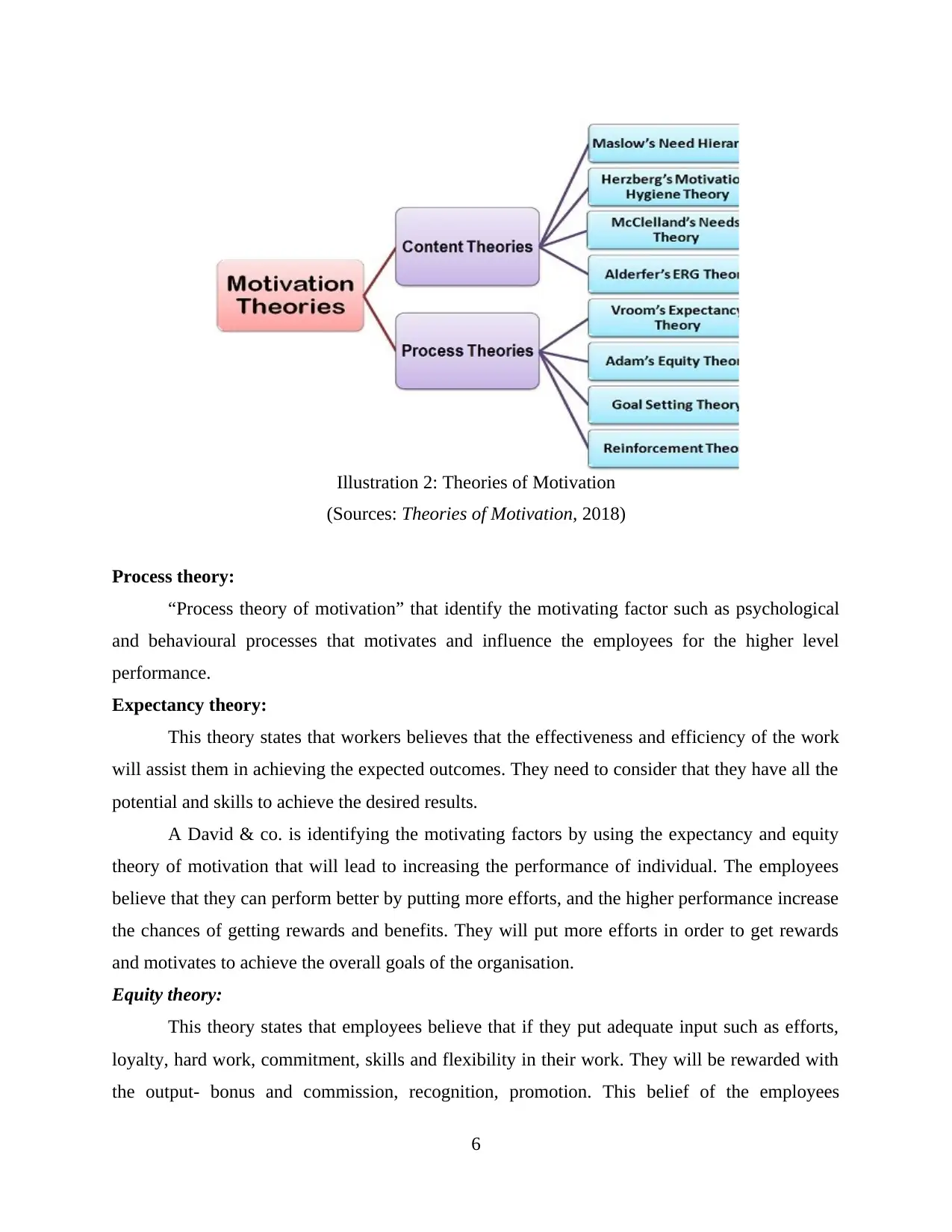
Process theory:
“Process theory of motivation” that identify the motivating factor such as psychological
and behavioural processes that motivates and influence the employees for the higher level
performance.
Expectancy theory:
This theory states that workers believes that the effectiveness and efficiency of the work
will assist them in achieving the expected outcomes. They need to consider that they have all the
potential and skills to achieve the desired results.
A David & co. is identifying the motivating factors by using the expectancy and equity
theory of motivation that will lead to increasing the performance of individual. The employees
believe that they can perform better by putting more efforts, and the higher performance increase
the chances of getting rewards and benefits. They will put more efforts in order to get rewards
and motivates to achieve the overall goals of the organisation.
Equity theory:
This theory states that employees believe that if they put adequate input such as efforts,
loyalty, hard work, commitment, skills and flexibility in their work. They will be rewarded with
the output- bonus and commission, recognition, promotion. This belief of the employees
6
Illustration 2: Theories of Motivation
(Sources: Theories of Motivation, 2018)
“Process theory of motivation” that identify the motivating factor such as psychological
and behavioural processes that motivates and influence the employees for the higher level
performance.
Expectancy theory:
This theory states that workers believes that the effectiveness and efficiency of the work
will assist them in achieving the expected outcomes. They need to consider that they have all the
potential and skills to achieve the desired results.
A David & co. is identifying the motivating factors by using the expectancy and equity
theory of motivation that will lead to increasing the performance of individual. The employees
believe that they can perform better by putting more efforts, and the higher performance increase
the chances of getting rewards and benefits. They will put more efforts in order to get rewards
and motivates to achieve the overall goals of the organisation.
Equity theory:
This theory states that employees believe that if they put adequate input such as efforts,
loyalty, hard work, commitment, skills and flexibility in their work. They will be rewarded with
the output- bonus and commission, recognition, promotion. This belief of the employees
6
Illustration 2: Theories of Motivation
(Sources: Theories of Motivation, 2018)
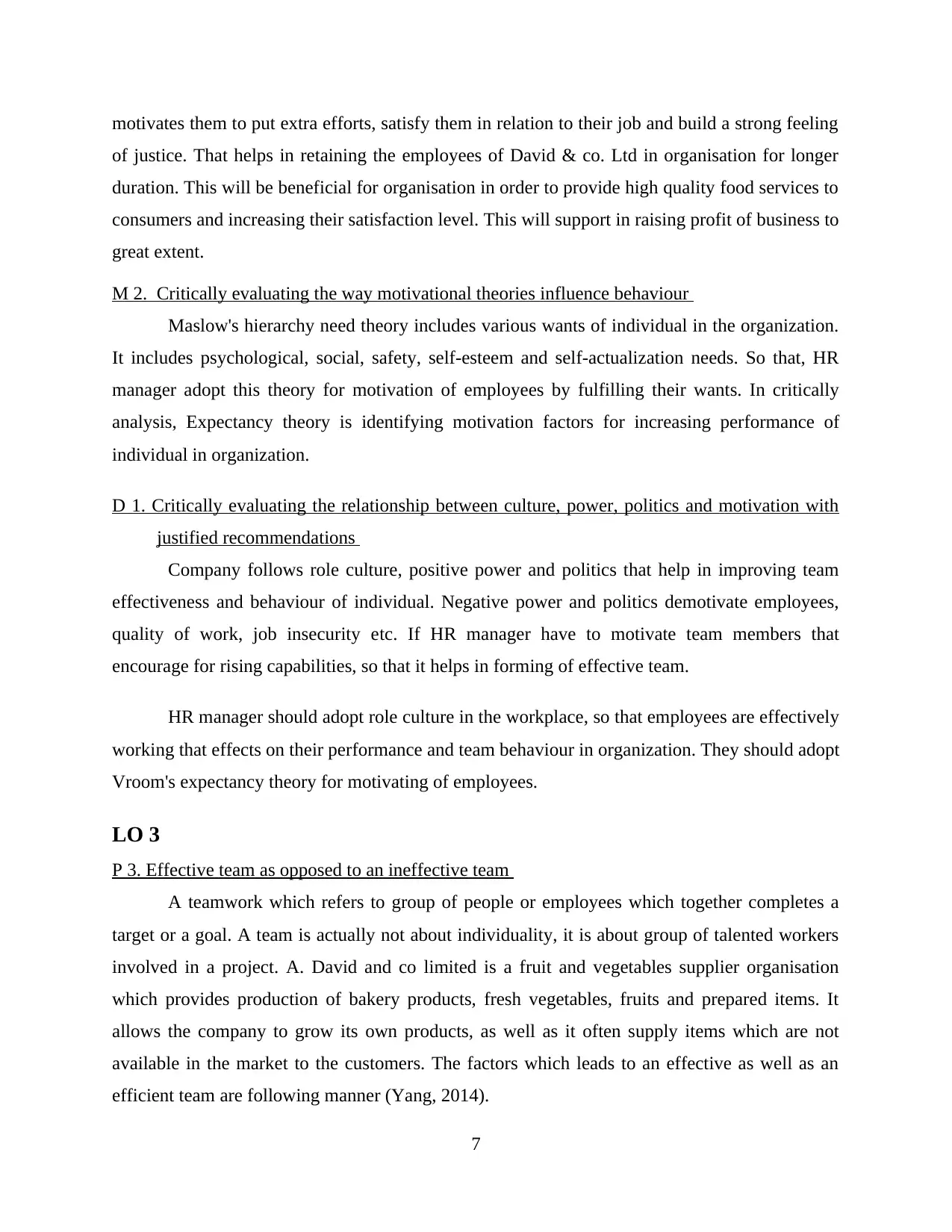
motivates them to put extra efforts, satisfy them in relation to their job and build a strong feeling
of justice. That helps in retaining the employees of David & co. Ltd in organisation for longer
duration. This will be beneficial for organisation in order to provide high quality food services to
consumers and increasing their satisfaction level. This will support in raising profit of business to
great extent.
M 2. Critically evaluating the way motivational theories influence behaviour
Maslow's hierarchy need theory includes various wants of individual in the organization.
It includes psychological, social, safety, self-esteem and self-actualization needs. So that, HR
manager adopt this theory for motivation of employees by fulfilling their wants. In critically
analysis, Expectancy theory is identifying motivation factors for increasing performance of
individual in organization.
D 1. Critically evaluating the relationship between culture, power, politics and motivation with
justified recommendations
Company follows role culture, positive power and politics that help in improving team
effectiveness and behaviour of individual. Negative power and politics demotivate employees,
quality of work, job insecurity etc. If HR manager have to motivate team members that
encourage for rising capabilities, so that it helps in forming of effective team.
HR manager should adopt role culture in the workplace, so that employees are effectively
working that effects on their performance and team behaviour in organization. They should adopt
Vroom's expectancy theory for motivating of employees.
LO 3
P 3. Effective team as opposed to an ineffective team
A teamwork which refers to group of people or employees which together completes a
target or a goal. A team is actually not about individuality, it is about group of talented workers
involved in a project. A. David and co limited is a fruit and vegetables supplier organisation
which provides production of bakery products, fresh vegetables, fruits and prepared items. It
allows the company to grow its own products, as well as it often supply items which are not
available in the market to the customers. The factors which leads to an effective as well as an
efficient team are following manner (Yang, 2014).
7
of justice. That helps in retaining the employees of David & co. Ltd in organisation for longer
duration. This will be beneficial for organisation in order to provide high quality food services to
consumers and increasing their satisfaction level. This will support in raising profit of business to
great extent.
M 2. Critically evaluating the way motivational theories influence behaviour
Maslow's hierarchy need theory includes various wants of individual in the organization.
It includes psychological, social, safety, self-esteem and self-actualization needs. So that, HR
manager adopt this theory for motivation of employees by fulfilling their wants. In critically
analysis, Expectancy theory is identifying motivation factors for increasing performance of
individual in organization.
D 1. Critically evaluating the relationship between culture, power, politics and motivation with
justified recommendations
Company follows role culture, positive power and politics that help in improving team
effectiveness and behaviour of individual. Negative power and politics demotivate employees,
quality of work, job insecurity etc. If HR manager have to motivate team members that
encourage for rising capabilities, so that it helps in forming of effective team.
HR manager should adopt role culture in the workplace, so that employees are effectively
working that effects on their performance and team behaviour in organization. They should adopt
Vroom's expectancy theory for motivating of employees.
LO 3
P 3. Effective team as opposed to an ineffective team
A teamwork which refers to group of people or employees which together completes a
target or a goal. A team is actually not about individuality, it is about group of talented workers
involved in a project. A. David and co limited is a fruit and vegetables supplier organisation
which provides production of bakery products, fresh vegetables, fruits and prepared items. It
allows the company to grow its own products, as well as it often supply items which are not
available in the market to the customers. The factors which leads to an effective as well as an
efficient team are following manner (Yang, 2014).
7
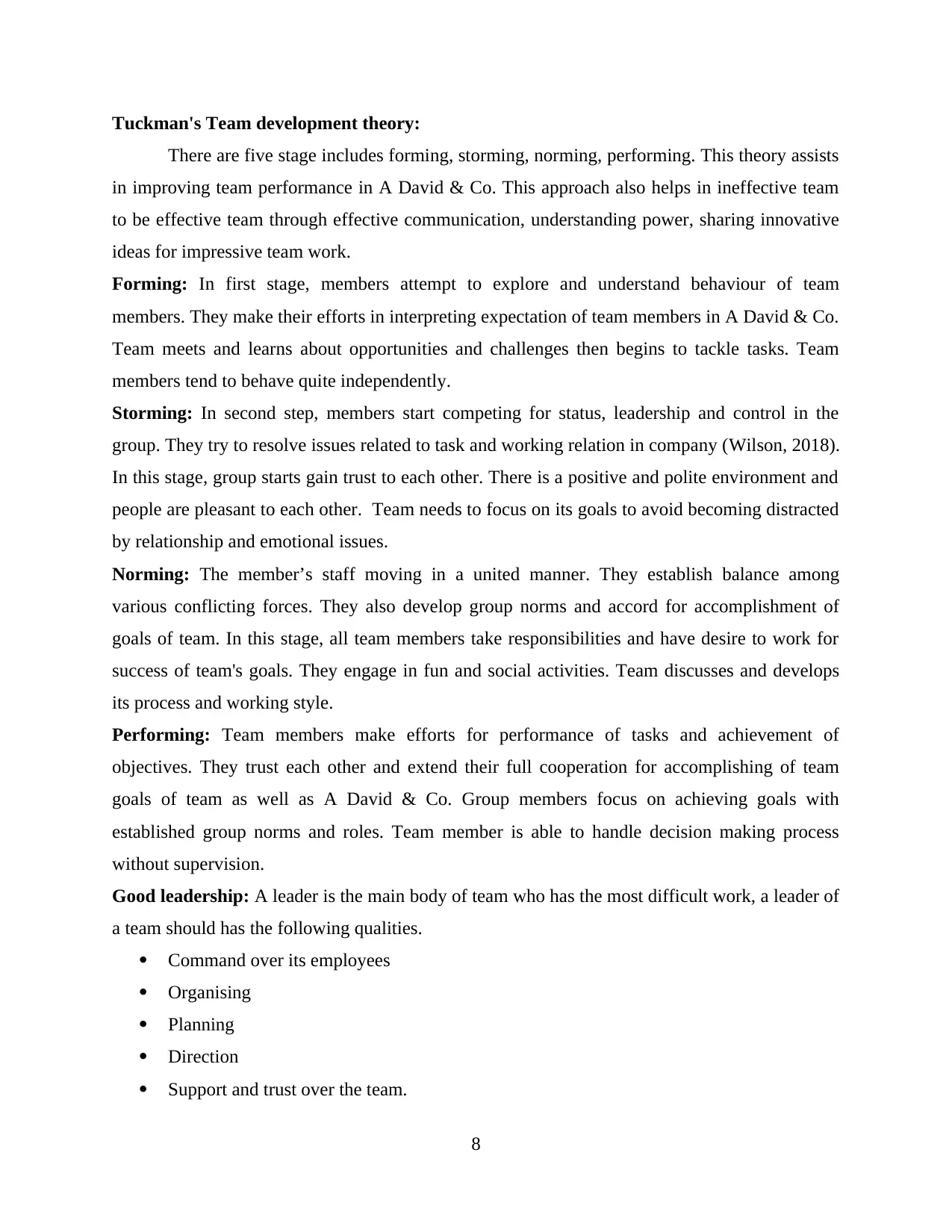
Tuckman's Team development theory:
There are five stage includes forming, storming, norming, performing. This theory assists
in improving team performance in A David & Co. This approach also helps in ineffective team
to be effective team through effective communication, understanding power, sharing innovative
ideas for impressive team work.
Forming: In first stage, members attempt to explore and understand behaviour of team
members. They make their efforts in interpreting expectation of team members in A David & Co.
Team meets and learns about opportunities and challenges then begins to tackle tasks. Team
members tend to behave quite independently.
Storming: In second step, members start competing for status, leadership and control in the
group. They try to resolve issues related to task and working relation in company (Wilson, 2018).
In this stage, group starts gain trust to each other. There is a positive and polite environment and
people are pleasant to each other. Team needs to focus on its goals to avoid becoming distracted
by relationship and emotional issues.
Norming: The member’s staff moving in a united manner. They establish balance among
various conflicting forces. They also develop group norms and accord for accomplishment of
goals of team. In this stage, all team members take responsibilities and have desire to work for
success of team's goals. They engage in fun and social activities. Team discusses and develops
its process and working style.
Performing: Team members make efforts for performance of tasks and achievement of
objectives. They trust each other and extend their full cooperation for accomplishing of team
goals of team as well as A David & Co. Group members focus on achieving goals with
established group norms and roles. Team member is able to handle decision making process
without supervision.
Good leadership: A leader is the main body of team who has the most difficult work, a leader of
a team should has the following qualities.
Command over its employees
Organising
Planning
Direction
Support and trust over the team.
8
There are five stage includes forming, storming, norming, performing. This theory assists
in improving team performance in A David & Co. This approach also helps in ineffective team
to be effective team through effective communication, understanding power, sharing innovative
ideas for impressive team work.
Forming: In first stage, members attempt to explore and understand behaviour of team
members. They make their efforts in interpreting expectation of team members in A David & Co.
Team meets and learns about opportunities and challenges then begins to tackle tasks. Team
members tend to behave quite independently.
Storming: In second step, members start competing for status, leadership and control in the
group. They try to resolve issues related to task and working relation in company (Wilson, 2018).
In this stage, group starts gain trust to each other. There is a positive and polite environment and
people are pleasant to each other. Team needs to focus on its goals to avoid becoming distracted
by relationship and emotional issues.
Norming: The member’s staff moving in a united manner. They establish balance among
various conflicting forces. They also develop group norms and accord for accomplishment of
goals of team. In this stage, all team members take responsibilities and have desire to work for
success of team's goals. They engage in fun and social activities. Team discusses and develops
its process and working style.
Performing: Team members make efforts for performance of tasks and achievement of
objectives. They trust each other and extend their full cooperation for accomplishing of team
goals of team as well as A David & Co. Group members focus on achieving goals with
established group norms and roles. Team member is able to handle decision making process
without supervision.
Good leadership: A leader is the main body of team who has the most difficult work, a leader of
a team should has the following qualities.
Command over its employees
Organising
Planning
Direction
Support and trust over the team.
8
Secure Best Marks with AI Grader
Need help grading? Try our AI Grader for instant feedback on your assignments.
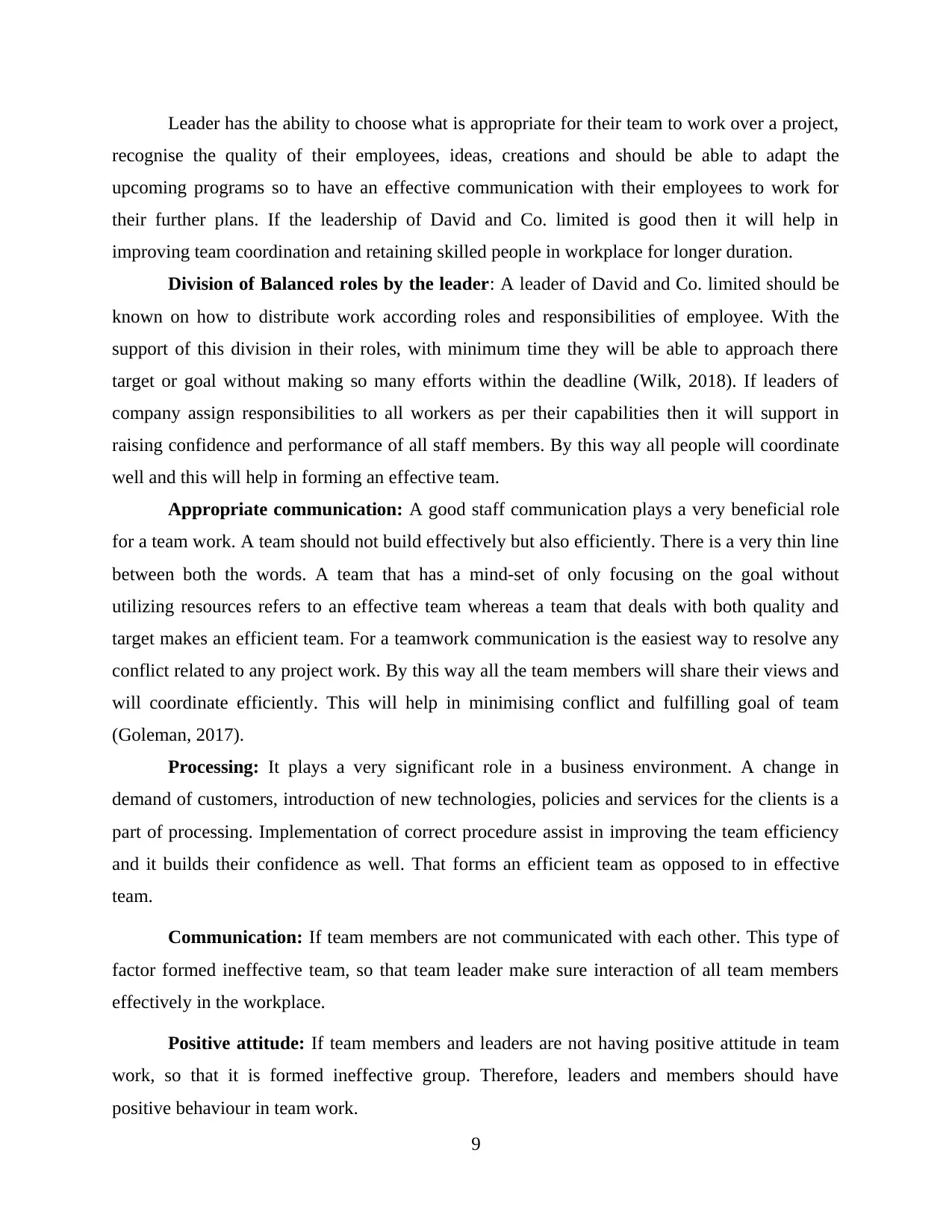
Leader has the ability to choose what is appropriate for their team to work over a project,
recognise the quality of their employees, ideas, creations and should be able to adapt the
upcoming programs so to have an effective communication with their employees to work for
their further plans. If the leadership of David and Co. limited is good then it will help in
improving team coordination and retaining skilled people in workplace for longer duration.
Division of Balanced roles by the leader: A leader of David and Co. limited should be
known on how to distribute work according roles and responsibilities of employee. With the
support of this division in their roles, with minimum time they will be able to approach there
target or goal without making so many efforts within the deadline (Wilk, 2018). If leaders of
company assign responsibilities to all workers as per their capabilities then it will support in
raising confidence and performance of all staff members. By this way all people will coordinate
well and this will help in forming an effective team.
Appropriate communication: A good staff communication plays a very beneficial role
for a team work. A team should not build effectively but also efficiently. There is a very thin line
between both the words. A team that has a mind-set of only focusing on the goal without
utilizing resources refers to an effective team whereas a team that deals with both quality and
target makes an efficient team. For a teamwork communication is the easiest way to resolve any
conflict related to any project work. By this way all the team members will share their views and
will coordinate efficiently. This will help in minimising conflict and fulfilling goal of team
(Goleman, 2017).
Processing: It plays a very significant role in a business environment. A change in
demand of customers, introduction of new technologies, policies and services for the clients is a
part of processing. Implementation of correct procedure assist in improving the team efficiency
and it builds their confidence as well. That forms an efficient team as opposed to in effective
team.
Communication: If team members are not communicated with each other. This type of
factor formed ineffective team, so that team leader make sure interaction of all team members
effectively in the workplace.
Positive attitude: If team members and leaders are not having positive attitude in team
work, so that it is formed ineffective group. Therefore, leaders and members should have
positive behaviour in team work.
9
recognise the quality of their employees, ideas, creations and should be able to adapt the
upcoming programs so to have an effective communication with their employees to work for
their further plans. If the leadership of David and Co. limited is good then it will help in
improving team coordination and retaining skilled people in workplace for longer duration.
Division of Balanced roles by the leader: A leader of David and Co. limited should be
known on how to distribute work according roles and responsibilities of employee. With the
support of this division in their roles, with minimum time they will be able to approach there
target or goal without making so many efforts within the deadline (Wilk, 2018). If leaders of
company assign responsibilities to all workers as per their capabilities then it will support in
raising confidence and performance of all staff members. By this way all people will coordinate
well and this will help in forming an effective team.
Appropriate communication: A good staff communication plays a very beneficial role
for a team work. A team should not build effectively but also efficiently. There is a very thin line
between both the words. A team that has a mind-set of only focusing on the goal without
utilizing resources refers to an effective team whereas a team that deals with both quality and
target makes an efficient team. For a teamwork communication is the easiest way to resolve any
conflict related to any project work. By this way all the team members will share their views and
will coordinate efficiently. This will help in minimising conflict and fulfilling goal of team
(Goleman, 2017).
Processing: It plays a very significant role in a business environment. A change in
demand of customers, introduction of new technologies, policies and services for the clients is a
part of processing. Implementation of correct procedure assist in improving the team efficiency
and it builds their confidence as well. That forms an efficient team as opposed to in effective
team.
Communication: If team members are not communicated with each other. This type of
factor formed ineffective team, so that team leader make sure interaction of all team members
effectively in the workplace.
Positive attitude: If team members and leaders are not having positive attitude in team
work, so that it is formed ineffective group. Therefore, leaders and members should have
positive behaviour in team work.
9
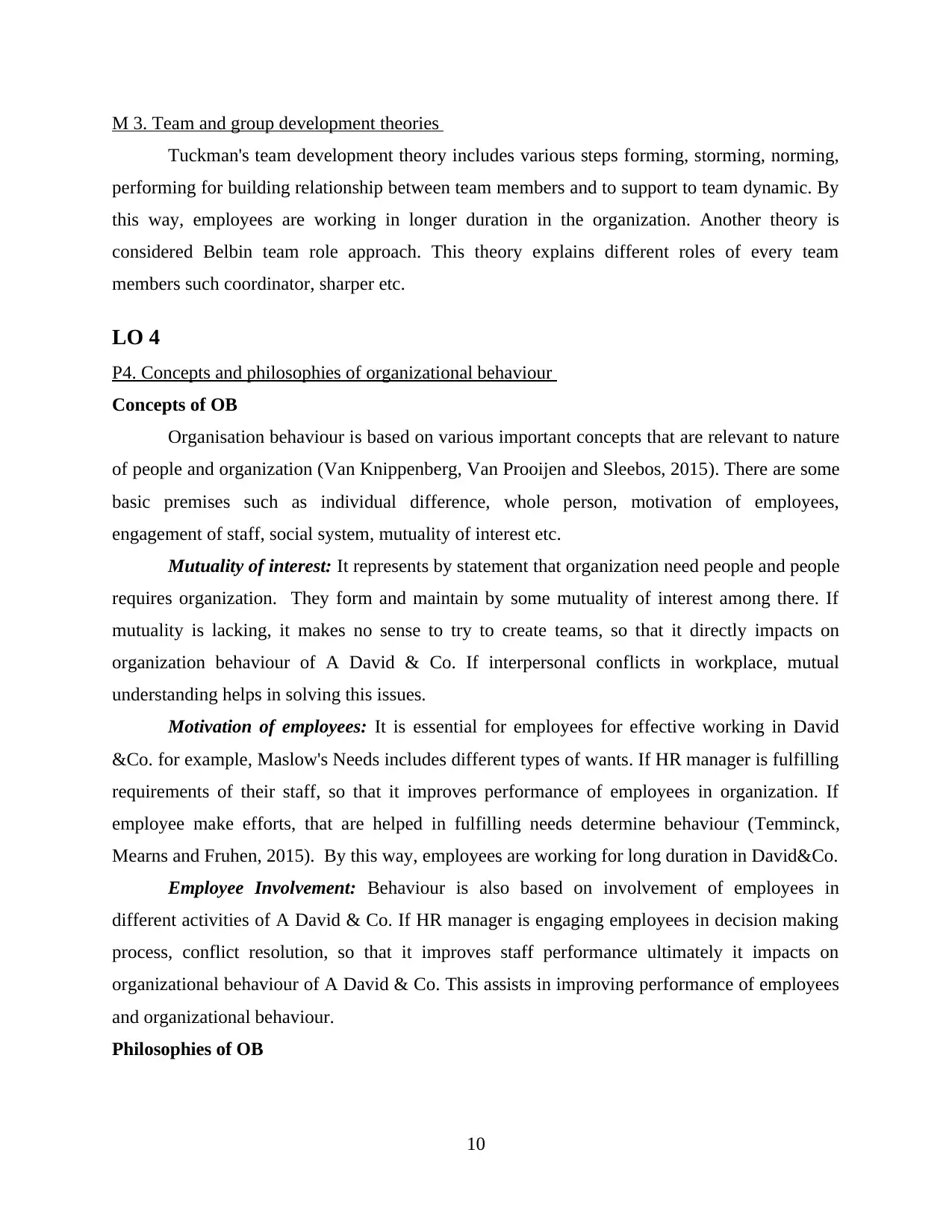
M 3. Team and group development theories
Tuckman's team development theory includes various steps forming, storming, norming,
performing for building relationship between team members and to support to team dynamic. By
this way, employees are working in longer duration in the organization. Another theory is
considered Belbin team role approach. This theory explains different roles of every team
members such coordinator, sharper etc.
LO 4
P4. Concepts and philosophies of organizational behaviour
Concepts of OB
Organisation behaviour is based on various important concepts that are relevant to nature
of people and organization (Van Knippenberg, Van Prooijen and Sleebos, 2015). There are some
basic premises such as individual difference, whole person, motivation of employees,
engagement of staff, social system, mutuality of interest etc.
Mutuality of interest: It represents by statement that organization need people and people
requires organization. They form and maintain by some mutuality of interest among there. If
mutuality is lacking, it makes no sense to try to create teams, so that it directly impacts on
organization behaviour of A David & Co. If interpersonal conflicts in workplace, mutual
understanding helps in solving this issues.
Motivation of employees: It is essential for employees for effective working in David
&Co. for example, Maslow's Needs includes different types of wants. If HR manager is fulfilling
requirements of their staff, so that it improves performance of employees in organization. If
employee make efforts, that are helped in fulfilling needs determine behaviour (Temminck,
Mearns and Fruhen, 2015). By this way, employees are working for long duration in David&Co.
Employee Involvement: Behaviour is also based on involvement of employees in
different activities of A David & Co. If HR manager is engaging employees in decision making
process, conflict resolution, so that it improves staff performance ultimately it impacts on
organizational behaviour of A David & Co. This assists in improving performance of employees
and organizational behaviour.
Philosophies of OB
10
Tuckman's team development theory includes various steps forming, storming, norming,
performing for building relationship between team members and to support to team dynamic. By
this way, employees are working in longer duration in the organization. Another theory is
considered Belbin team role approach. This theory explains different roles of every team
members such coordinator, sharper etc.
LO 4
P4. Concepts and philosophies of organizational behaviour
Concepts of OB
Organisation behaviour is based on various important concepts that are relevant to nature
of people and organization (Van Knippenberg, Van Prooijen and Sleebos, 2015). There are some
basic premises such as individual difference, whole person, motivation of employees,
engagement of staff, social system, mutuality of interest etc.
Mutuality of interest: It represents by statement that organization need people and people
requires organization. They form and maintain by some mutuality of interest among there. If
mutuality is lacking, it makes no sense to try to create teams, so that it directly impacts on
organization behaviour of A David & Co. If interpersonal conflicts in workplace, mutual
understanding helps in solving this issues.
Motivation of employees: It is essential for employees for effective working in David
&Co. for example, Maslow's Needs includes different types of wants. If HR manager is fulfilling
requirements of their staff, so that it improves performance of employees in organization. If
employee make efforts, that are helped in fulfilling needs determine behaviour (Temminck,
Mearns and Fruhen, 2015). By this way, employees are working for long duration in David&Co.
Employee Involvement: Behaviour is also based on involvement of employees in
different activities of A David & Co. If HR manager is engaging employees in decision making
process, conflict resolution, so that it improves staff performance ultimately it impacts on
organizational behaviour of A David & Co. This assists in improving performance of employees
and organizational behaviour.
Philosophies of OB
10
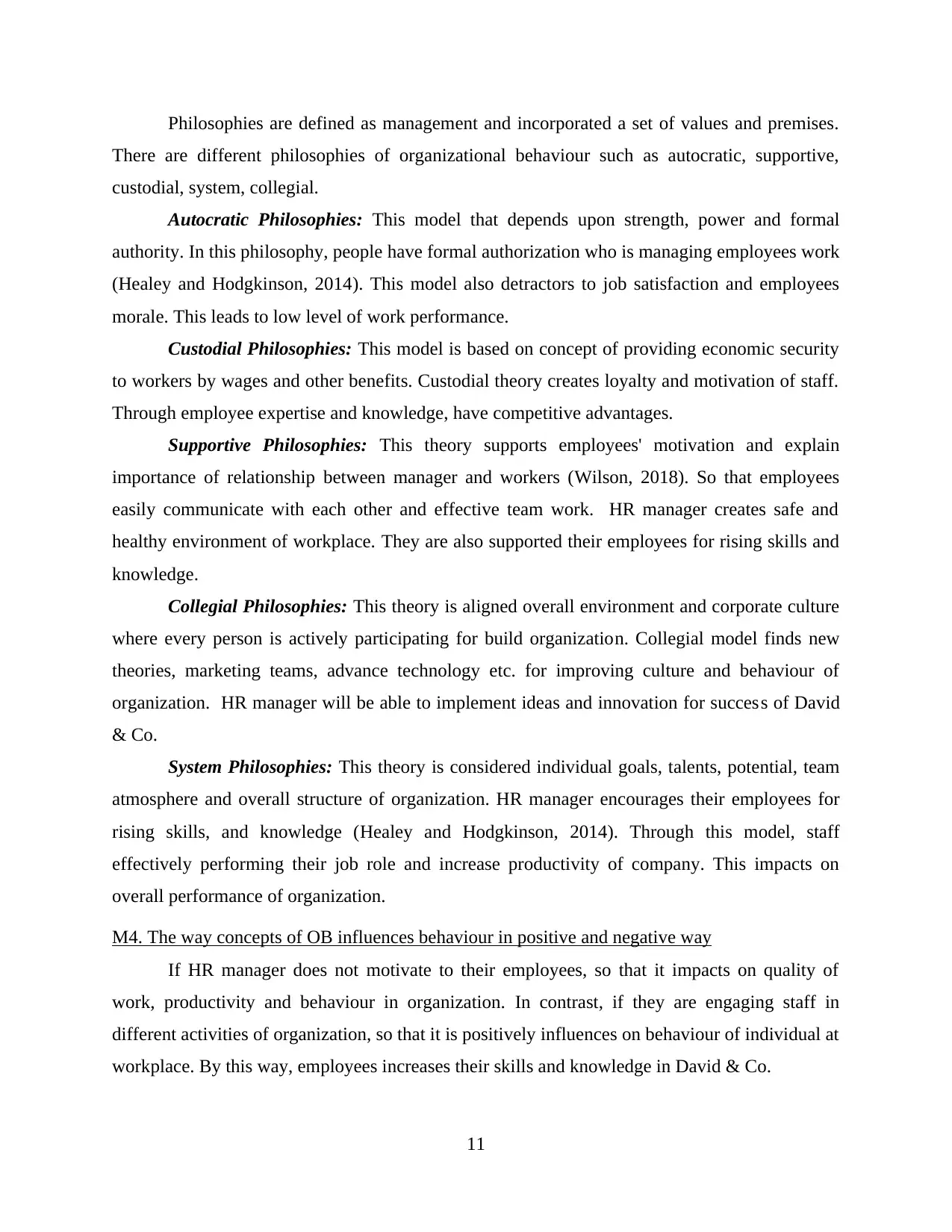
Philosophies are defined as management and incorporated a set of values and premises.
There are different philosophies of organizational behaviour such as autocratic, supportive,
custodial, system, collegial.
Autocratic Philosophies: This model that depends upon strength, power and formal
authority. In this philosophy, people have formal authorization who is managing employees work
(Healey and Hodgkinson, 2014). This model also detractors to job satisfaction and employees
morale. This leads to low level of work performance.
Custodial Philosophies: This model is based on concept of providing economic security
to workers by wages and other benefits. Custodial theory creates loyalty and motivation of staff.
Through employee expertise and knowledge, have competitive advantages.
Supportive Philosophies: This theory supports employees' motivation and explain
importance of relationship between manager and workers (Wilson, 2018). So that employees
easily communicate with each other and effective team work. HR manager creates safe and
healthy environment of workplace. They are also supported their employees for rising skills and
knowledge.
Collegial Philosophies: This theory is aligned overall environment and corporate culture
where every person is actively participating for build organization. Collegial model finds new
theories, marketing teams, advance technology etc. for improving culture and behaviour of
organization. HR manager will be able to implement ideas and innovation for success of David
& Co.
System Philosophies: This theory is considered individual goals, talents, potential, team
atmosphere and overall structure of organization. HR manager encourages their employees for
rising skills, and knowledge (Healey and Hodgkinson, 2014). Through this model, staff
effectively performing their job role and increase productivity of company. This impacts on
overall performance of organization.
M4. The way concepts of OB influences behaviour in positive and negative way
If HR manager does not motivate to their employees, so that it impacts on quality of
work, productivity and behaviour in organization. In contrast, if they are engaging staff in
different activities of organization, so that it is positively influences on behaviour of individual at
workplace. By this way, employees increases their skills and knowledge in David & Co.
11
There are different philosophies of organizational behaviour such as autocratic, supportive,
custodial, system, collegial.
Autocratic Philosophies: This model that depends upon strength, power and formal
authority. In this philosophy, people have formal authorization who is managing employees work
(Healey and Hodgkinson, 2014). This model also detractors to job satisfaction and employees
morale. This leads to low level of work performance.
Custodial Philosophies: This model is based on concept of providing economic security
to workers by wages and other benefits. Custodial theory creates loyalty and motivation of staff.
Through employee expertise and knowledge, have competitive advantages.
Supportive Philosophies: This theory supports employees' motivation and explain
importance of relationship between manager and workers (Wilson, 2018). So that employees
easily communicate with each other and effective team work. HR manager creates safe and
healthy environment of workplace. They are also supported their employees for rising skills and
knowledge.
Collegial Philosophies: This theory is aligned overall environment and corporate culture
where every person is actively participating for build organization. Collegial model finds new
theories, marketing teams, advance technology etc. for improving culture and behaviour of
organization. HR manager will be able to implement ideas and innovation for success of David
& Co.
System Philosophies: This theory is considered individual goals, talents, potential, team
atmosphere and overall structure of organization. HR manager encourages their employees for
rising skills, and knowledge (Healey and Hodgkinson, 2014). Through this model, staff
effectively performing their job role and increase productivity of company. This impacts on
overall performance of organization.
M4. The way concepts of OB influences behaviour in positive and negative way
If HR manager does not motivate to their employees, so that it impacts on quality of
work, productivity and behaviour in organization. In contrast, if they are engaging staff in
different activities of organization, so that it is positively influences on behaviour of individual at
workplace. By this way, employees increases their skills and knowledge in David & Co.
11
Paraphrase This Document
Need a fresh take? Get an instant paraphrase of this document with our AI Paraphraser
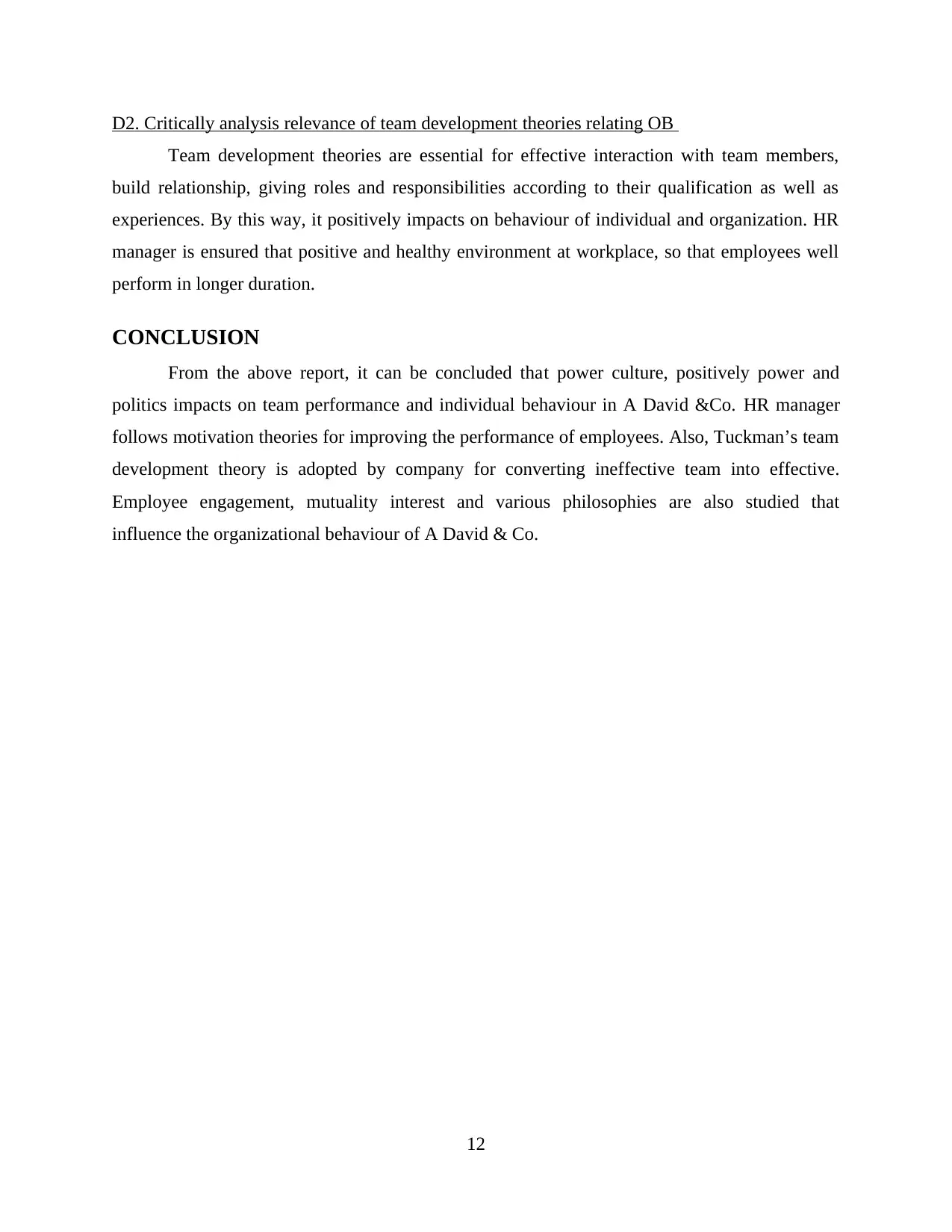
D2. Critically analysis relevance of team development theories relating OB
Team development theories are essential for effective interaction with team members,
build relationship, giving roles and responsibilities according to their qualification as well as
experiences. By this way, it positively impacts on behaviour of individual and organization. HR
manager is ensured that positive and healthy environment at workplace, so that employees well
perform in longer duration.
CONCLUSION
From the above report, it can be concluded that power culture, positively power and
politics impacts on team performance and individual behaviour in A David &Co. HR manager
follows motivation theories for improving the performance of employees. Also, Tuckman’s team
development theory is adopted by company for converting ineffective team into effective.
Employee engagement, mutuality interest and various philosophies are also studied that
influence the organizational behaviour of A David & Co.
12
Team development theories are essential for effective interaction with team members,
build relationship, giving roles and responsibilities according to their qualification as well as
experiences. By this way, it positively impacts on behaviour of individual and organization. HR
manager is ensured that positive and healthy environment at workplace, so that employees well
perform in longer duration.
CONCLUSION
From the above report, it can be concluded that power culture, positively power and
politics impacts on team performance and individual behaviour in A David &Co. HR manager
follows motivation theories for improving the performance of employees. Also, Tuckman’s team
development theory is adopted by company for converting ineffective team into effective.
Employee engagement, mutuality interest and various philosophies are also studied that
influence the organizational behaviour of A David & Co.
12
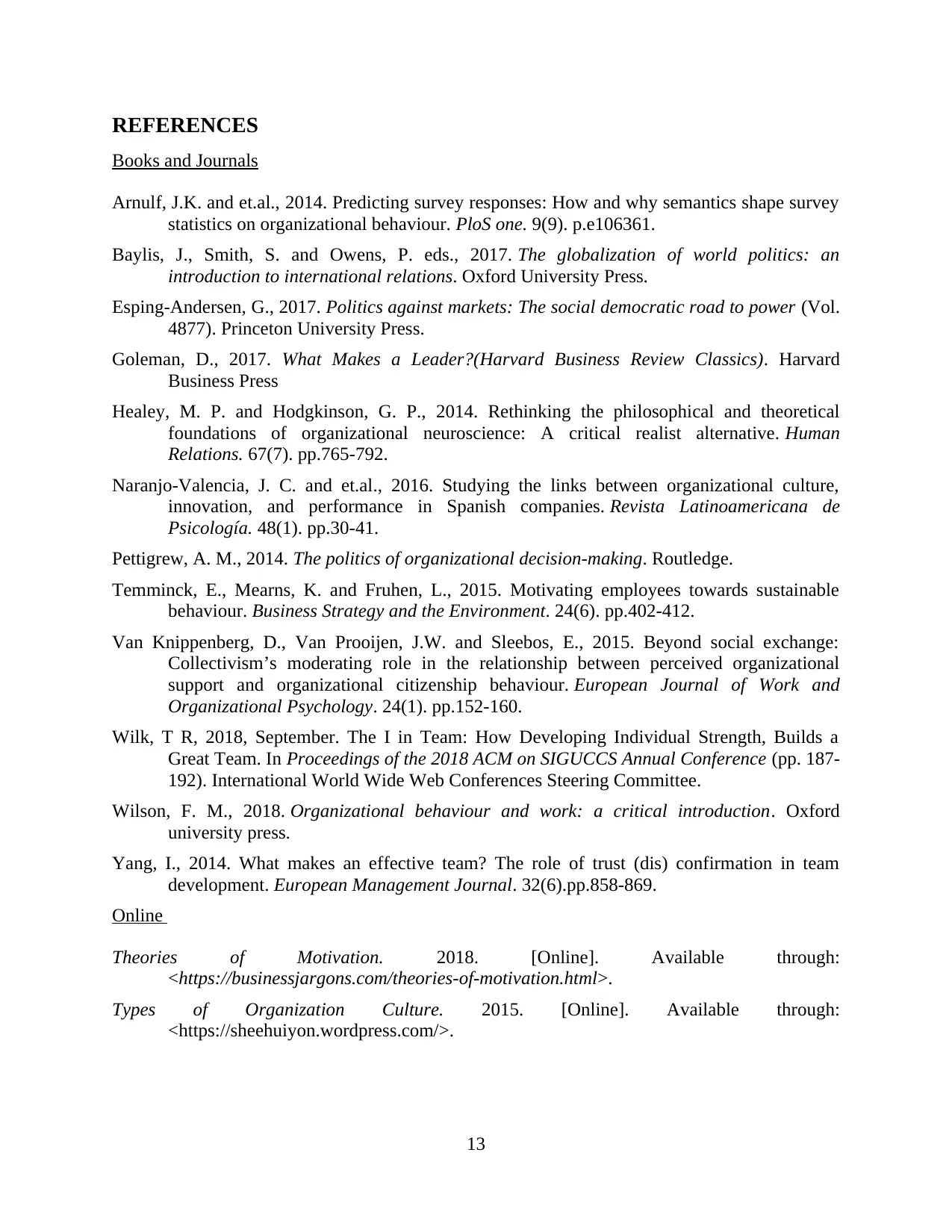
REFERENCES
Books and Journals
Arnulf, J.K. and et.al., 2014. Predicting survey responses: How and why semantics shape survey
statistics on organizational behaviour. PloS one. 9(9). p.e106361.
Baylis, J., Smith, S. and Owens, P. eds., 2017. The globalization of world politics: an
introduction to international relations. Oxford University Press.
Esping-Andersen, G., 2017. Politics against markets: The social democratic road to power (Vol.
4877). Princeton University Press.
Goleman, D., 2017. What Makes a Leader?(Harvard Business Review Classics). Harvard
Business Press
Healey, M. P. and Hodgkinson, G. P., 2014. Rethinking the philosophical and theoretical
foundations of organizational neuroscience: A critical realist alternative. Human
Relations. 67(7). pp.765-792.
Naranjo-Valencia, J. C. and et.al., 2016. Studying the links between organizational culture,
innovation, and performance in Spanish companies. Revista Latinoamericana de
Psicología. 48(1). pp.30-41.
Pettigrew, A. M., 2014. The politics of organizational decision-making. Routledge.
Temminck, E., Mearns, K. and Fruhen, L., 2015. Motivating employees towards sustainable
behaviour. Business Strategy and the Environment. 24(6). pp.402-412.
Van Knippenberg, D., Van Prooijen, J.W. and Sleebos, E., 2015. Beyond social exchange:
Collectivism’s moderating role in the relationship between perceived organizational
support and organizational citizenship behaviour. European Journal of Work and
Organizational Psychology. 24(1). pp.152-160.
Wilk, T R, 2018, September. The I in Team: How Developing Individual Strength, Builds a
Great Team. In Proceedings of the 2018 ACM on SIGUCCS Annual Conference (pp. 187-
192). International World Wide Web Conferences Steering Committee.
Wilson, F. M., 2018. Organizational behaviour and work: a critical introduction. Oxford
university press.
Yang, I., 2014. What makes an effective team? The role of trust (dis) confirmation in team
development. European Management Journal. 32(6).pp.858-869.
Online
Theories of Motivation. 2018. [Online]. Available through:
<https://businessjargons.com/theories-of-motivation.html>.
Types of Organization Culture. 2015. [Online]. Available through:
<https://sheehuiyon.wordpress.com/>.
13
Books and Journals
Arnulf, J.K. and et.al., 2014. Predicting survey responses: How and why semantics shape survey
statistics on organizational behaviour. PloS one. 9(9). p.e106361.
Baylis, J., Smith, S. and Owens, P. eds., 2017. The globalization of world politics: an
introduction to international relations. Oxford University Press.
Esping-Andersen, G., 2017. Politics against markets: The social democratic road to power (Vol.
4877). Princeton University Press.
Goleman, D., 2017. What Makes a Leader?(Harvard Business Review Classics). Harvard
Business Press
Healey, M. P. and Hodgkinson, G. P., 2014. Rethinking the philosophical and theoretical
foundations of organizational neuroscience: A critical realist alternative. Human
Relations. 67(7). pp.765-792.
Naranjo-Valencia, J. C. and et.al., 2016. Studying the links between organizational culture,
innovation, and performance in Spanish companies. Revista Latinoamericana de
Psicología. 48(1). pp.30-41.
Pettigrew, A. M., 2014. The politics of organizational decision-making. Routledge.
Temminck, E., Mearns, K. and Fruhen, L., 2015. Motivating employees towards sustainable
behaviour. Business Strategy and the Environment. 24(6). pp.402-412.
Van Knippenberg, D., Van Prooijen, J.W. and Sleebos, E., 2015. Beyond social exchange:
Collectivism’s moderating role in the relationship between perceived organizational
support and organizational citizenship behaviour. European Journal of Work and
Organizational Psychology. 24(1). pp.152-160.
Wilk, T R, 2018, September. The I in Team: How Developing Individual Strength, Builds a
Great Team. In Proceedings of the 2018 ACM on SIGUCCS Annual Conference (pp. 187-
192). International World Wide Web Conferences Steering Committee.
Wilson, F. M., 2018. Organizational behaviour and work: a critical introduction. Oxford
university press.
Yang, I., 2014. What makes an effective team? The role of trust (dis) confirmation in team
development. European Management Journal. 32(6).pp.858-869.
Online
Theories of Motivation. 2018. [Online]. Available through:
<https://businessjargons.com/theories-of-motivation.html>.
Types of Organization Culture. 2015. [Online]. Available through:
<https://sheehuiyon.wordpress.com/>.
13
1 out of 15
Your All-in-One AI-Powered Toolkit for Academic Success.
+13062052269
info@desklib.com
Available 24*7 on WhatsApp / Email
![[object Object]](/_next/static/media/star-bottom.7253800d.svg)
Unlock your academic potential
© 2024 | Zucol Services PVT LTD | All rights reserved.





